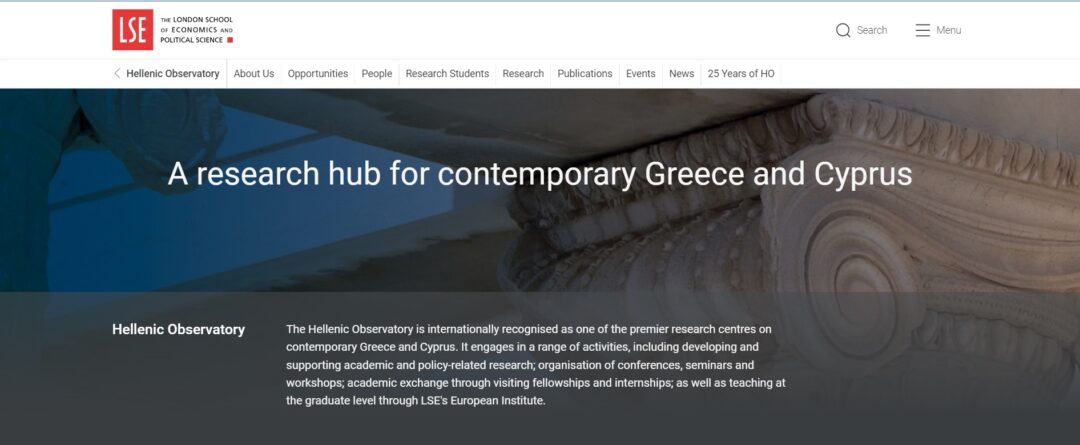Vassilis Monastiriotis is Professor of Political Economy at the European Institute, London School of Economics and holder of the Eleftherios Venizelos Chair in Contemporary Greek Studies at the Hellenic Observatory. He is Affiliated Professor at the Department of Geography and Environment, LSE, and Deputy Director of the LSE Research unit on Southeast Europe (LSEE). His research focuses on economic policy and performance at the regional, national and supra-national levels, with emphasis on labour markets and economic development. He has published numerous articles in economics and regional science journals and has received various distinctions including the Moss Madden Medal in Regional Science (2008). In 2018-2021 he served as member at the Independent Experts Committee on the Minimum Wage in Greece. He is Co-editor of Spatial Economic Analysis (Taylor & Francis).
Vassilis Monastiriotis spoke to Rethinking Greece* on the priorities of research on contemporary Greece for the Hellenic Observatory, on the effects of the prolonged ‘pre-accession’ process in the Balkans and the role Greece can play as a provider of political and geo-political support to democratic consolidation, on the state of the Greek labour market almost 15 years after the crisis and finally, on the ability of the Greek economy to follow the ‘twin transition’ towards a green and digital future.
The role of both the Eleftherios Venizelos Chair and the Director of the Observatory is to promote the multidisciplinary study of contemporary Greek politics, economy and society. As the new Eleftherios Venizelos Chair, what are the aspects of contemporary Greece that you think research should be steered towards?
Building on the excellent leadership of my predecessor, Professor Kevin Featherstone, the Hellenic Observatory developed over the years a highly influential research agenda focusing in particular on public policy-making and the political economy of reforms in the country. This included the study of reform pathways, bottlenecks and resistances, the functioning of the Core Executive, the impact of the European Union on domestic policy, the political, diplomatic and economic role of Greece in its wider South-eastern European context, as well as – through my own research – the functioning, regulation and performance of the Greek labour market. While the country has been praised internationally for its reform record over the past few years, recent events – especially in relation to Storm Daniel in the region of Thessaly and the devastation it caused – have shown that there are still important steps to be taken towards the modernisation of the country’s public administration. In that sense, researching – and producing evidence-based policy advice – on issues of governance, public administration and structural reforms remains a priority.
At the same time, we see today – e.g., in the issues that emerged with the new ID cards – that the Greek society continues to be characterised by significant cleavages that go beyond the socio-economic and extend to the cultural and ideational. New movements (e.g., «the beach towel revolt») and new social demands for modernisation continue to co-exist with more traditionalist social norms (especially on religious, gender and national-identity matters) and more long-standing claims for redistribution, reflecting social divisions and tensions that can threaten the cohesion of the social fabric. My aspiration is that, in its study of contemporary Greece, the Hellenic Observatory will open up more to the analysis of these social and cultural cleavages, aiming at contributing towards a better understanding of the dimensions along which these cleavages operate: from aspects of socio-economic inequality and conditions of precarity, insecurity and exclusion in the labour market, to the role of media (both mainstream and social/decentralised) in managing information, forming beliefs and perhaps exacerbating ideational conflicts, to enduring socio-geographical divides (rural-urban and core-periphery dichotomies), and to inter-generational differences in income security, opportunities and wealth – to list but a few.
Of course, as an economist, my steer and own interests will be more in the direction of studying the Greek economy: problems of spatial cohesion and connectivity; investment deficits and problems of competitiveness; the ability of the labour market to create ‘good jobs’, with high pay and decent working conditions; the dynamism of micro-firms and internationalisation of SMEs; improvements in the tax system and in financial incentives; and of course, the ability of the Greek economy to follow – and perhaps lead – the ‘twin transition’ towards a green and digital future with social justice.
In all this, the focus will remain to a large extent on policy. But we also want to obtain a more ‘decentralised’ focus, looking more closely at agency: from businesses and social organisations to the role of leaders and socio-economic actors in mobilising development, modernisation and structural transformation, both in the economy and in society.

In recent years, the focus of the Observatory has expanded to cover both Greece and Cyprus, and to relate these to both the rest of the European Union and to Southeast Europe. In light of the recent Athens Declaration by 11 Balkan leaders, how do you see the future of the region in the EU and what role do you think Greece can play in that future?
Twenty years since the flagship Thessaloniki Summit, the so-called Western Balkans remain today in a relative limbo, trapped in a prolonged state of “pre-accession” and struggling with their own challenges of democratisation and economic modernisation. As is widely discussed in the literature, including by my colleague at the Hellenic Observatory Dr Spyros Economides, the prolonged pre-accession process has created a bad equilibrium of ‘token compliance’ (by the Balkan states) and seemingly ‘empty promises’ (by the EU). In a recent work (with Fatmir Besimi) I have studied the mechanics of compliance to EU accession conditionality and have shown analytically that full compliance cannot be achieved so long as there is uncertainty in the public concerning the distributional consequences of accession. There are two implications of this. First, that the rewards of accession have to become more visible, not only with regard to some long-term ‘end-game’ but also with regard to immediate material benefits for the populations in the region. Second, that incomplete compliance should not be demonised: full compliance should be a target, a ceiling, not a floor.
The events in Ukraine have showed the urgency and geopolitical significance of ‘finishing off’ with the prolonged ‘pre-accession’ process in the Balkans. In this sense, the European perspective of the region remains not only the top priority for policy but also the only credible option for the path of the countries in the region to democratic consolidation, global economic integration and international security. There is no doubt that Greece can play a central role in this path, not only due to its geographical position but also due to its historical and cultural ties with the region. However, chronic problems of cooperation have compounded with the consequences of the fiscal crisis in the country to undermine both the ability and the willingness of Greece to play this role. Greece is no longer the big investor that it once was in the Balkans; its political weight in the region has decreased; while other actors – from Turkey to the Gulf States and from China to Russia – have sought to increase their influence and presence in the region. Still, Greece remains today the main and most credible economic and geo-political partner for the countries in the region. The Prespa Agreement, despite occasional criticisms that have been applied to it, paves the way for more normalised relations with our immediate neighbours in the region; while the economic recovery post-2016 has created conditions for renewing the impetus for further economic integration and cooperation.
But delivering on this role requires – like in the case of economic development policies and domestic reform strategies – a firm plan with specific actions to be supported or directly pursued by coordinated policy measures. In the past, Greece implemented its own development programme in the region – the Greek Plan for Economic Reconstruction in the Balkans (ESOAV) – with an active diplomatic and foreign policy presence and a standing as one of the main investors in the region in sectors such as telecommunications, banking, distribution, health and others. Today Greece does not have the ability to implement a development programme in the Balkans (and, thanks to EU assistance, neither is there a similar need), neither can its economy support the volumes of outward foreign direct investment that Greece had directed to the Balkans in previous decades. In the absence of these, what Greece can do in – and for – the Balkans is to provide political and geo-political support to democratic consolidation, the fight against corruption and the management of external influences by non-western actors, as well as to economic modernisation, diversification along the lines of the green & digital transition and integration into the regional and global supply chains.

“Directing private investment towards productive activities includes re-balancing taxation on profits and on real estate, re-evaluating the contribution of the tourism industry, modernising the education system towards internationalising higher education and supporting more vocational qualifications in cutting-edge sectors and tasks.”
As an economist, Labour Economics is among the areas you specialize in. What is the state of the labour market in Greece almost 15 years after the shock of the crisis?
The Greek labour market was severely affected by the crisis. Starting already from a weak equilibrium – remember, unemployment rates in Greece were amongst the highest in Europe even in the ‘good days’ before the crisis – the repeated negative demand shocks that came with the uneasy negotiations of the bailout agreements led not only to skyrocketing unemployment but also to a general deterioration in pay and working conditions, with significant rises in underemployment, occupational downgrading and skill mismatches. Although the situation has in many respects turned around in recent years, and especially post-covid, there are still important problems that remain. One of the main issues, in my view, is the quality of jobs: the Greek economy has been for decades, and especially following the fiscal crisis, in a low-wage – low-productivity equilibrium, with employers typically opening low quality jobs based on price/cost competition considerations. This creates pressures for outmigration to highly skilled individuals (the so-called brain drain) and significant skill mismatches for those that remain behind, reducing the so-called ‘returns to education’ and thus also the rates of investment in new skills and skills upgrading.
The recent generous increases in the minimum wage – starting with the increase of 2019 under the recommendation of the first Minimum Wage Committee, of which I was a member – have sought to push the economy towards a higher-wage equilibrium but, while they do not seem to have impacted significantly on employment, they are not sufficient in themselves to push the economy towards creating better – more decent and more productive – jobs. The latter requires a more concerted “big push” effort by policy, that will direct the economy towards more productive activities, incorporating innovation and investment in new technologies and skills. The framework for this is there – thanks to the pathbreaking policy shift of the EU towards the ‘twin’ (green and digital) transition. But achieving this requires two blocks of interventions that fall outside the traditional realm of labour market policy: on the one hand, an ambitious and targeted public investment programme that will seek to mobilise private investment; on the other hand, a significant overhaul of the tax system and of product market regulation, that will aim at steering private economic activity towards high value-added and technology-intensive activities.
In a recent study (with Sasa Randjelovic) we have shown empirically that public investment raises the productivity of private capital, creating incentives for more investment in the private sector. Directing this investment towards productive activities is the role of Industrial Policy and includes rebalancing taxation on profits (from distributed earnings to reinvestment) and on real estate, re-evaluating the contribution of the tourism industry (factoring-in its environmental impact, and its capacity to diversify towards higher-end activities, e.g. agritourism, ecotourism, etc.), modernising the education system towards internationalising higher education and supporting more vocational qualifications in cutting-edge sectors and tasks, and recalibrating the regulation in the labour market. It also involves rebalancing the economy geographically, by supporting the diversification and re-specialisation of the regional economies and enhancing their functional connectivity with the “core” (Athens) as well as with the international economy (through integration into the regional and global supply chains).
There are other problems too – ones that have to do with the supply of labour and how this is affected by widespread social norms concerning employment and family: especially with regard to female employment participation (owing to a very gendered division of labour in household production), the elasticity of labour supply by the youth (owing to very traditionalist family relations) and the mobility of labour both geographically (where mobility is exceptionally low by international standards) and by sector or occupation. In this sense, the main problems of the Greek labour market today are outside the labour market: they concern social relations outside the economy, as well as the structure of the economy at large and its dynamism – both of which impede on the creation of good jobs: jobs that raise the welfare of those in employment and create a positive environment for future job creation through demand spillovers and production complementarities.

“Greece has many things going for it, from natural energy resources and natural advantages concerning tourism, to latent comparative advantages relating to its highly educated workforce (especially in the diaspora) and pockets of cutting-edge expertise in STEM sectors. Its geography offers also geopolitical advantages which can also support the economy.”
The structural reforms necessary the Greek economy to become more competitive have been discussed in the public sphere for quite some time. What do you believe are the prospects of economic growth in Greece? Can EU’s cohesion policies play a role in that?
Greece has registered an arguably impressive recovery since exiting the Adjustment Programmes, with persistently declining unemployment, fast growth rates and significant upgrades in terms of competitiveness and exports. The country has also managed to weather well the various shocks and crises that have happened since, from the implications of Brexit to the COVID pandemic and now the war in Ukraine. We see significant improvements not only in the economy but also in parts of public administration and government. The recent upgrading of Greece’s credit status by the main credit rating agencies is a testimony to this. On the other hand, Greece has not been able to transform itself in sufficient extent, to modernise its economy and to improve sufficiently in its quality of government and institutions, as I mentioned also above. Various studies, including the 2020 report by the Pissarides Commission, have highlighted clearly the deficits of the economy in terms of competitiveness and especially the problems with regulation (over-regulation in some areas and under-regulation elsewhere), economic structure (low value-added specialisations, small firm sizes and small land ownership, fragmented economic space, both sectorally and geographically) and the – so called – directionality of growth (low rates of investment, investment directed mainly to unproductive or low-innovation activities such as real estate and hospitality, geographical over-concentration of financial capital, etc).
The current challenge of the ‘twin transition’ raises the challenge to even higher levels but at the same time creates opportunities for a new narrative on growth and on socio-economic development and modernisation – combined with new resources, including by the EU (as we have seen with the Resilience and Recovery Fund – RRF – and more recently with the emergency assistance offered by the EU after Storm Daniel). It is true that Greece has relied for decades now on the generous transfers to the country through the EU’s Cohesion Policy (and more recently the RRF). The support of the EU for the country’s development, modernisation and transition to a green & digital economy is of paramount importance. At the same time, the country has on the whole not been able to make the most of the money that have accrued into its economy from the EU. While further/continuing assistance will definitely help, the country needs to find not only a new growth strategy but also – and more importantly – the ability to implement (and, of course, design) said strategy effectively. In some past work (with collegue Andreas Antoniades), I had shown that the main problem of Greece – in that case, concerning structural reforms and policy change – is in what political scientist Peter Hall coined as the ‘accumulation of anomalies’ (understanding the problem) and the ‘experimentation with new ideas’ (experimenting with policy solutions based on evidence-based policy advice and deliberation).Whereas this research was focused specifically on the country’s “reform technology”, I am convinced that the same applies in the case of the country’s growth strategy.
Greece has many things going for it, from natural energy resources and natural advantages concerning tourism, to latent comparative advantages relating to its highly educated workforce (especially in the diaspora) and pockets of cutting-edge expertise in STEM sectors. Its geography offers also geopolitical advantages which can also support the economy. But for the country to transform into a modern, high-income and high welfare country, the presence of natural and latent advantages is not sufficient: the country needs a painstakingly thought-out strategy for growth. A strategy that will support the country’s growth acceleration and economic transformation, consistent with the objectives of the green & digital transition, by specifying in a targeted way the direction of growth (‘directionality’) and the path via which new specialisations will emerge in order to support the selected growth path. In that regard, there is still quite some way to go for Greece. As we say in the academic world, “further work is needed”… The Hellenic Observatory, consistent with LSE’ motto of ‘knowing the causes of things for the betterment of society’, will be here to help in this direction for many years to come.
*Interview to Ioulia Livaditi
See also from Greek News Agenda:

TAGS: ANALYSIS | BALKANS | ECONOMY & DEVELOPMENT | LABOUR RELATIONS















